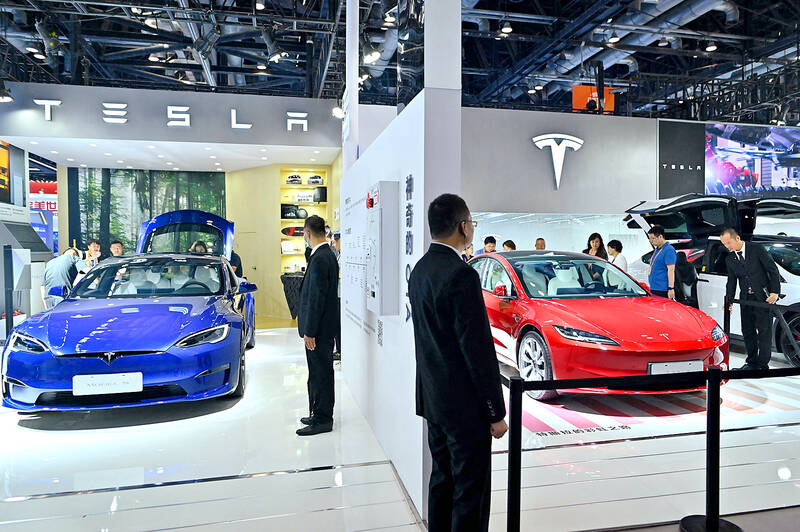Tesla Inc’s job cuts are escalating in China, sources familiar with the matter said, as Elon Musk contends with growing pressure to win back share in the world’s biggest auto market.
Additional layoffs began earlier this week, extending cuts from last month, as part of the electric vehicle (EV) maker’s pledge to slash global headcount by more than 10 percent, said the sources, who asked not to be identified as they are not authorized to disclose the information publicly.
The latest move affects a range of departments, including customer service staff, engineers, production line workers and the logistics team at Tesla’s Shanghai plant — home to more than half the company’s global production, the sources said, adding that the layoffs last month more directly impacted sales representatives.

Photo: AFP
It is unclear how many people would be affected and what impact it might have on Tesla’s China operations. The company’s China-based representatives did not immediately respond to requests for comments.
A global slowdown in EV demand has sparked Tesla’s biggest layoffs. However, the hit has been particularly acute in China, where intense competition from rivals like BYD Co and weak consumer sentiment is hurting sales. Shipments from its Shanghai factory dropped 18 percent last month even as the overall market for new energy vehicles grew 33 percent.
Tesla’s China market share shrank to about 7.5 percent in the first quarter of this year, from 10.5 percent in the same period last year, Bloomberg News calculations showed.
In addition to the ongoing cuts, Tesla’s China business would see the return of Tom Zhu (朱曉彤), who previously headed the automaker’s Asia-Pacific operations and led its entry into China, Bloomberg News reported on Wednesday. Zhu had been promoted to senior vice president of automotive in April last year, overseeing global production, sales, deliveries, service and the company’s factories from Tesla’s Austin headquarters.
The layoffs come despite Tesla winning in-principle approval from government officials to deploy its driver-assistance system in China, which would be an immediate revenue boost. It was granted the approval under certain conditions and managed to clear two important hurdles: Reaching a mapping and navigation deal with Chinese tech giant Baidu Inc, and meeting requirements for how it handles data-security and privacy issues.
Most of the laid-off employees in China would receive a payout equivalent to one month’s pay for every year worked, plus an additional three months’ salary, sources familiar with the matter said.
Some staff were escorted out of their workplaces by managers and some left in groups via shuttle buses, one of the sources said.
Globally, a growing number of executives have left Tesla, most of the company’s 500-person Supercharger team and its newly formed marketing team have been axed, and the automaker is rescinding offers just weeks before internships were set to start.

In Italy’s storied gold-making hubs, jewelers are reworking their designs to trim gold content as they race to blunt the effect of record prices and appeal to shoppers watching their budgets. Gold prices hit a record high on Thursday, surging near US$5,600 an ounce, more than double a year ago as geopolitical concerns and jitters over trade pushed investors toward the safe-haven asset. The rally is putting undue pressure on small artisans as they face mounting demands from customers, including international brands, to produce cheaper items, from signature pieces to wedding rings, according to interviews with four independent jewelers in Italy’s main

Japanese Prime Minister Sanae Takaichi has talked up the benefits of a weaker yen in a campaign speech, adopting a tone at odds with her finance ministry, which has refused to rule out any options to counter excessive foreign exchange volatility. Takaichi later softened her stance, saying she did not have a preference for the yen’s direction. “People say the weak yen is bad right now, but for export industries, it’s a major opportunity,” Takaichi said on Saturday at a rally for Liberal Democratic Party candidate Daishiro Yamagiwa in Kanagawa Prefecture ahead of a snap election on Sunday. “Whether it’s selling food or

CONCERNS: Tech companies investing in AI businesses that purchase their products have raised questions among investors that they are artificially propping up demand Nvidia Corp chief executive officer Jensen Huang (黃仁勳) on Saturday said that the company would be participating in OpenAI’s latest funding round, describing it as potentially “the largest investment we’ve ever made.” “We will invest a great deal of money,” Huang told reporters while visiting Taipei. “I believe in OpenAI. The work that they do is incredible. They’re one of the most consequential companies of our time.” Huang did not say exactly how much Nvidia might contribute, but described the investment as “huge.” “Let Sam announce how much he’s going to raise — it’s for him to decide,” Huang said, referring to OpenAI

The global server market is expected to grow 12.8 percent annually this year, with artificial intelligence (AI) servers projected to account for 16.5 percent, driven by continued investment in AI infrastructure by major cloud service providers (CSPs), market researcher TrendForce Corp (集邦科技) said yesterday. Global AI server shipments this year are expected to increase 28 percent year-on-year to more than 2.7 million units, driven by sustained demand from CSPs and government sovereign cloud projects, TrendForce analyst Frank Kung (龔明德) told the Taipei Times. Demand for GPU-based AI servers, including Nvidia Corp’s GB and Vera Rubin rack systems, is expected to remain high,